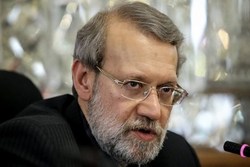 Iranian Parliament Speaker Ali Larijani said on Monday that his country is still welcoming intra-regional dialogues, adding that Tehran sees talks as the only solution to problems with some Arab states of the Persian Gulf.
Iranian Parliament Speaker Ali Larijani said on Monday that his country is still welcoming intra-regional dialogues, adding that Tehran sees talks as the only solution to problems with some Arab states of the Persian Gulf. RNA - “The Islamic Republic of Iran considers political dialogue as the solution for differences with some Arab states in the Middle East and we are ready for talks,” Larijani said in a meeting with a group of Lebanese elites in Beirut this morning.
Larijani went on to refer to Foreign Minister Mohammad Javad Zarif’s remarks who had expressed readiness for negotiating with Saudi Arabia earlier.
“We are close to some neighboring Arab countries and share the same notion; we do not like cutting ties and we believe that misunderstandings can be resolved through dialogue.”
“We are not escaping from dialogue but it is the others who refrain from it,” he said, adding, “America is pressuring them into refusing to talk with Iran; meanwhile, some of them hold talks and cooperate with us in secret but openly make anti-Iran remarks.”
On Friday, Iranian Ambassador to Serbia Rashid Hassanpour called on the regional countries to do their best to pave the way for intra-regional negotiations.
“Today more than ever comprehensive negotiations among regional countries is needed,” Hassanpour said addressing a ceremony to commemorate the 41st anniversary of the Islamic Revolution victory which was held in the presence of Serbian diplomats, cultural and academic figures, reporters and the Iranian nationals.
He said that misunderstandings and miscalculations are the most important regional issues.
“Iran has always tried to present peace and tranquility by proposals like Hormuz Peace Endeavor (HOPE),” Hassanpour added.
He pointed out that over the last four decades, Iran has become one of the most advanced scientific and industrial countries in genetics, nanotechnology, air defense aerospace, nuclear energy, media and IT fields.
On Tuesday, Iranian Ambassador to Italy Hamid Bayat renewed his country’s call for inclusive dialogue in the Middle East, saying Tehran believes intra-regional interactions based on mutual understanding is the sole way out of the current state of affairs.
Speaking in a meeting held to commemorate the 41st anniversary of the Islamic Revolution victory, Bayat elaborated on Islamic Revolution’s achievements despite US sanctions and pressures, and highlighted that Tehran’s policy is to resolve Middle East issues through negotiations with regional states and without intervention of foreign forces.
Last month, Zarif echoed Tehran’s willingness to hold talks with Saudi Arabia and other Persian Gulf countries to promote regional security, and strengthen intra-regional relations.
"We are ready for negotiations with Saudi Arabia and other Persian Gulf littoral states and we are ready to give proposals regarding security in this region, particularly the Strait of Hormuz," Zarif said in an address to a meeting held in the Indian city of Mumbai in coordination with All India Association of Industries (AIAI).
According to Fars News Agency, he added that Iran has also presented proposals on ways to establish peace in the Strait of Hormuz.
In an address to the 74th session of the United Nations General Assembly on September 25, Iranian President Hassan Rouhani said as a steward of maritime security in the Persian Gulf and the Strait of Hormuz, Iran invites all countries that are affected by developments in the strategic region to join the country’s new regional peace initiative, dubbed Hormuz Peace Endeavor (HOPE).
In October, Iranian Deputy Foreign Minister Seyed Abbas Araqchi said that the current unstable situation in the Persian Gulf region is the outcome of Washington’s interventions in the region, reminding that Tehran is after the prosperity of the Middle East.
The current tense situation in the Persian Gulf region is affected by the US interventionist policies while the priority of the Islamic Republic of Iran is to realize security, stability and economic prosperity for the entire region, Araqchi said, in a meeting with Portuguese Foreign Ministry's Director-General for Political Affairs Pedro Sanchez Da Costa Pereira.
847/940